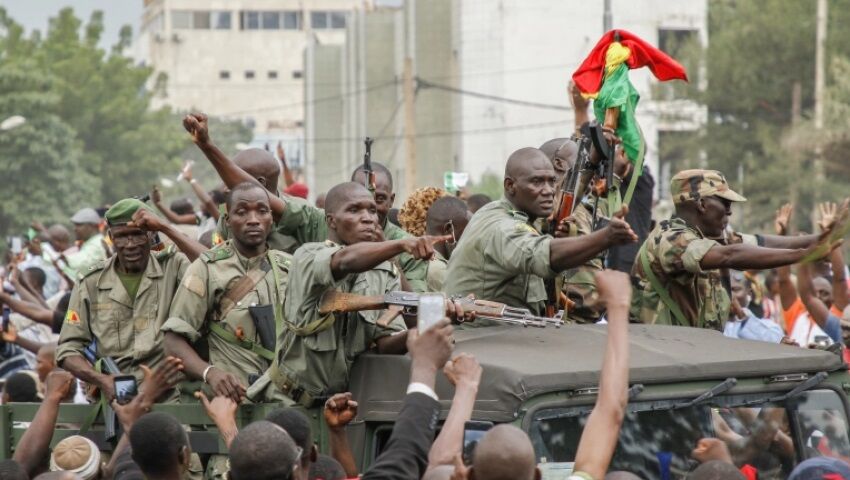In an interview with the Strategic Council on Foreign Relations website, Yasser Kanani stated that coups in Africa are not a new issue. In the 20th century, this continent witnessed various coups after independence from colonialism, adding Dependence of the governments based in those countries on the colonial system and dissatisfaction of the members of the society due to poverty, lack of transparency, and especially bad and successive governments as well as hereditary governments have always exposed the continent to coups.
Recalling that Africa is involved in a 500-year-old history of colonialism, he explained the role and influence of colonialists in the coups as are witnessed in Africa today and noted: In recent years, especially from 2020 onwards, we are facing the phenomenon of coups in West African countries mainly including Francophone Africa, or French-speaking Africa, and this makes the issue even more important. Mali, Burkina Faso, Gabon, and Niger, which have been subjected to coups and military governments, were part of the Francophone Union for centuries. France had extensive political, economic, cultural, and military interventions there and had made many investments in West African countries in line with securing its own interests.
Kanani added: After the war in Ukraine, geopolitical changes have occurred in Africa, and given the dependence of most African countries and their armies on the equipment and financial and development aid from the West, Russia by supporting the coups and playing a more prominent role, while creating a new front for Europeans in Africa, tried to get out of the conflict crisis with Europe.
The analyst of African affairs discussed the causes of coups in Mali, Niger, and Burkina Faso while stating that the presidents and statesmen who were at the top of duties in those countries were dependent on France and were supported politically and economically by that country, added: By exerting influence, France sought to establish dependent rulers in those countries. From 2012 onwards, when France and Western forces entered Mali to impose their military policies on the countries of the Sahel region under the name of the anti-terrorism project, an immense identity crisis occurred in the region.
Kanani added: This issue continued for a decade, and finally, the presidents of those countries, each of whom had extended their presence in power for several terms, put their armies and military forces as their main supporters.
Examining the background of the coup in Gabon, he stated that the “Ali Bongo” family had the entire country under their control for 55 years. He said that the hereditary power sequence and lack of transparency caused the opposition, political parties, and activists in different areas to complain to Western societies. In the end, France and Western forces kept their forces, and by repeating the same mistake they made with “Ben Ali” in the Arab Spring, they inevitably lost “Ali Bongo” in Gabon. France does not give up troops easily, but it has already lost troops in Niger, Mali, Burkina Faso and Gabon.
The researcher of African affairs added: After the Ukraine war, other geopolitical developments have occurred in Africa; most African countries and their armies depended on equipment and financial and development aid from the West. During that period, while playing a more prominent role, Russia tried to reduce the crisis of its conflict with Europe by creating a new front for Europeans in Africa. Europe’s weak point was in West Africa; those tensions and coups have less been seen in East Africa. But in West Africa, due to the dependence on the French political system, this problem increased, and the coup regimes that came to power received logistical support and backing from Russia; they received military equipment, and all of this made them feel empowered and enable to fight against former colonialists.
Stating that Russia has not denied sending the Wagner militia group to Central African countries, interfering in the peace process, and playing a role in various African countries, Kanani said: When the military council ruling over Mali stopped the operation of the UN peacekeepers and expelled their forces, Russia and China quickly announced their readiness to cover this vacuum due to their connections and influence over military authorities. Delivery of equipment and logistical support is being done openly. In the recent conference of Russia with African countries, the presence of the generals of those countries was very prominent, and Russia gave them legitimacy.
He pointed out that in the discussion of the grain crisis, the six African countries that remained Russia’s allies, despite all the maritime communication problems, directly benefited from the grain aid donated by Russia. This was a message to other African countries that have not yet joined this Russian alliance and are having doubts. Russia, with the tools at its disposal, can disrupt their food security and face them with a crisis.
The expert on African affairs, while referring to Europe’s measures in this regard, including sending various mediators with the aim of preventing further reduction of their power, continued: Western countries, considering the passivity they have shown and the dispersion of conflicts in that region, try to avoid those coups from spreading to other African countries that are powerful allies of France, such as Ivory Coast, Senegal and other countries supported by Britain, and to influence the public opinion and stabilize their dependent regimes through manipulation and changes.
He stated that the West will pursue solutions based on the tools it has in international institutios to influence the hegemony that Russia is trying to achieve and weaken its power in the region, adding: They hope that by joining new players in the region, including Saudi Arabia, which will host the Saudi-African summit in Riyadh in November, will indirectly pursue their goals.










0 Comments